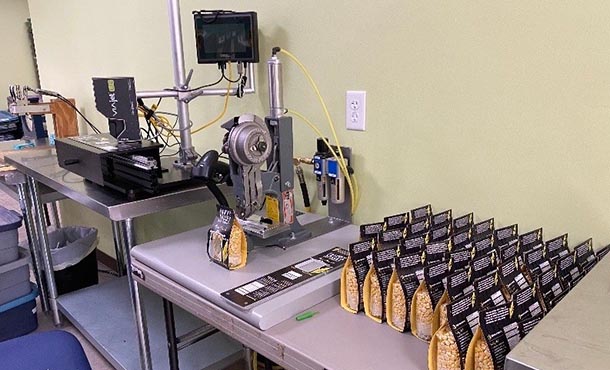
The MPERIA setup now runs smoothly at Happy Valley Soup Company”s facility. IMAGE: MARIA VIGHETTI
Getting the code to bring Happy Valley's soup to a store near you
A summertime internship project leads to a world of possibilities
9/22/2020
By Miranda Buckheit
UNIVERSITY PARK, Pa. — In 2016, Happy Valley Soup Company expanded its gourmet dried soup mix operations and entered the mass retail market, selling the mixes in grocery stores in seven states and online through Amazon. To keep up with retail demand, the company significantly increased production, leading to a need for improved manufacturing and inventory tracking.
The company needed to implement a production lot code tracking system for its ingredients to meet Food and Drug Administration (FDA) requirements. A lot code assigns an identifier to all products in each production lot on the product label, which can be traced and identified in Happy Valley Soup Company’s records.
Additionally, FDA requirements mandate that a label on a package of food must have the proper name of the product, name, address and license number of the manufacturer, lot number or other identification number, expiration date and serving size.
To meet the FDA’s traceability specifications, Happy Valley Soup Company worked with Matthews Marking Systems this past summer to create a reliable method of printing production lot codes on its soup mix packaging. As a global supplier of marking and coding solutions for product identification, branding and traceability, Matthews improves coding efficiency and accuracy through MPERIA, the industry's only universal marking and coding automation controller. Charlie Purdum, professor of practice and director of industry relations in Penn State’s Harold and Inge Marcus Department of Industrial and Manufacturing Engineering, connected the two companies.
“There were two components of this project: one was to help Happy Valley Soup Company integrate their enterprise resource planning (ERP) system with Matthews’ MPERIA control platform for data handling so that the proper date and lot codes could be automatically printed onto Happy Valley Soup Company’s packaging,” Steve Jupena, senior director of sales for Matthews, said. “A second component was the material handling challenge being that Happy Valley Soup Company was not marking on a traditional conveyor. A printing station had to be designed so that it would hold the packaging in the proper position, trigger the MPERIA system to print and to traverse the Matthews printhead across the Happy Valley Soup Company package to print the right codes, in the right spot, at the right time.”
Maria Vighetti, a 2020 industrial engineering alumna, and Nicolas Vasquez, a senior industrial engineering student, worked on the project through the Penn State College of Engineering’s Bernard M. Gordon Learning Factory’s summer 2020 virtual 10-week internship program.
Vighetti lead the effort to integrate Happy Valley Soup Company’s OrderTime ERP system with MPERIA. ERP systems are process management software that integrate various applications to manage a company’s various functions.
Vasquez led the design of a printing rig. The custom printing rig had to work with the existing set up in the Happy Valley Soup Company’s facility while being as easy as possible to operate with a relatively inexpensive build price.
The duo worked closely so the two systems could properly print the required lot code and best buy dates on the labels.
“As a small business, I did not have the resources to put toward implementing an ERP system or setting up a lot code printing process,” Greg Williams, current owner of Happy Valley Soup Company, said. “The students made it happen with a substantial cost savings for our company.”
For Vighetti, the experience allowed her to see what it is like to work in industry by “going out there and doing the work.”
“I always saw myself in manufacturing or consulting, but food manufacturing wasn’t something that I focused on,” Vighetti said. “To help out a small food manufacturing business has been great to get experience in different areas like seeing what it means to work in a team and tracking project progress.”
Vasquez said that the work felt hands-on and not strictly rooted in theories.
“I felt like I was a part of this from the moment I joined the team,” Vasquez said. “They didn’t treat me like an intern. They were all great people.”



